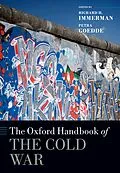The Oxford Handbook of the Cold War offers a broad reassessment of the period war based on new conceptual frameworks developed in the field of international history. Nearing the 25th anniversary of its end, the cold war now emerges as a distinct period in twentieth-century history, yet one which should be evaluated within the broader context of global political, economic, social, and cultural developments. The editors have brought together leading scholars in cold war history to offer a new assessment of the state of the field and identify fundamental questions for future research. The individual chapters in this volume evaluate both the extent and the limits of the cold war's reach in world history. They call into question orthodox ways of ordering the chronology of the cold war and also present new insights into the global dimension of the conflict. Even though each essay offers a unique perspective, together they show the interconnectedness between cold war and national and transnational developments, including long-standing conflicts that preceded the cold war and persisted after its end, or global transformations in areas such as human rights or economic and cultural globalization. Because of its broad mandate, the volume is structured not along conventional chronological lines, but thematically, offering essays on conceptual frameworks, regional perspectives, cold war instruments and cold war challenges. The result is a rich and diverse accounting of the ways in which the cold war should be positioned within the broader context of world history.
Autorentext
Richard H. Immerman is Professor and Edward J. Buthusiem Family Distinguished Faculty Fellow in History at Temple University and the Marvin Wachman Director of its Center for the Study of Force and Diplomacy. He currently chairs the Historical Advisory Committee to the United States' Department of State. Petra Goedde is Associate Professor of History at Temple University.
Inhalt
- 1: 1. Introduction: Richard H. Immerman/Petra Goedde
- Part I: Conceptual Frameworks
- 2: Akira Iriye: Historicizing the Cold War
- 3: Naoko Shibusawa: Ideology, Culture, and the Cold War
- 4: Ian Jackson: Economics and the Cold War
- 5: Geoffrey Warner: Geopolitics and the Cold War
- 6: Prasenjit Duara: The Cold War and the Imperialism of Nation States
- Part II: Regional Cold Wars/Cold War Crises
- 7: Vladimir Pechatnov: The US-Soviet Relationship
- 8: Rana Mitter: China
- 9: Klaus Larres: Great Britain
- 10: Andreas Etges: Western Europe
- 11: Bernd Stoever: Eastern Europe
- 12: Lars Schoultz: Latin America
- 13: Andrew Rotter: South Asia
- 14: Ang Chen Guan: Southeast Asia
- 15: Salim Yaqub: The Cold War and the Middle East
- 16: Elizabeth Schmidt: Africa
- 17: Antony Best: Japan and the Cold War
- Part III: Waging the Cold War
- 18: Vladislav Zubok: Cold War Strategies/Power and Culture - East
- 19: Christopher Endy: Power and Culture in the West
- 20: David Stone: Military
- 21: Campbell Craig: Atomic Peace and Warfare
- 22: Amy Sayward: International Institutions
- 23: Robert Mark Spaulding: Trade, Aid, and Economic Warfare
- 24: John Prados: Cold War Intelligence History
- Part IV: Challenging the Cold War Paradigm
- 25: Philip Gassert: Internal Challenges to the Cold War: Oppositional Movements East and West
- 26: Penny Von Eschen: Locating the Transnational in the Cold War
- 27: Cary Fraser: Decolonization
- 28: Barbara Keys and Roland Burke: Human Rights
- 29: Brenda Gayle Plummer: Race
- 30: Helen Laville: Gender
- 31: Dianne Kirby: Religion
- 32: Richard P. Tucker: Environment
- 33: Hyung Gu Lynn: Globalization
- 34: Nicholas Guyatt: The End of the Cold War
